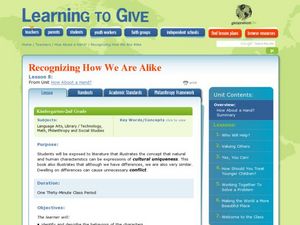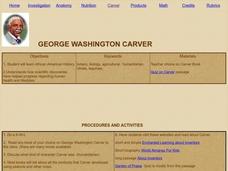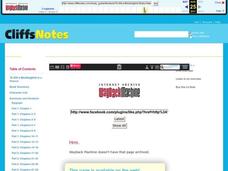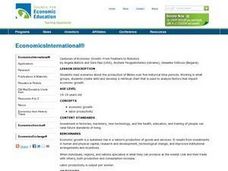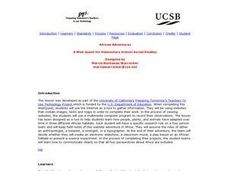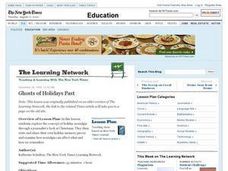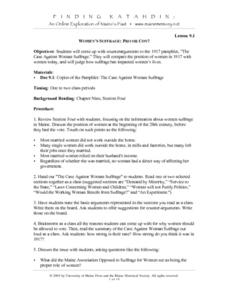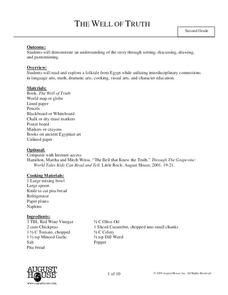Curated OER
Recognizing How We Are Alike
Students explore the concept of social justice. In this service learning worksheet, students read The Sneeches in order to appreciate cultural uniqueness.
Curated OER
George Washington Carver
Learners learn and research the life of George Washington Carver. In this historical figures instructional activity, students read a book on George Washington Carver, discuss his character and the challenges he faced in becoming a...
Curated OER
The Brand New Kid
Second graders explore cultural differences through reading. In this culture lesson plan, 2nd graders read the book The Brand New Kid by Katie Couric. Students discuss scenes from the book and how the character feels. Student get with a...
Curated OER
To Kill a Mockingbird by Harper Lee
In this online interactive reading comprehension worksheet, students respond to an essay question based on Lee's To Kill a Mockingbird. Students may also access an online quiz on the selection using the link at the bottom of the page.
Curated OER
What is Judaism?
In this Judaism worksheet, students read a 3-page article about the Jewish religion and traditions. Students then respond to 8 matching and 4 short answer questions based on the reading selection.
Curated OER
Life Along the Trail
Learners explore the significance of the Louisiana Purchase and the journey of Lewis and Clark's Corps of Discovery. They read to explain a new topic and write to inform readers of the historic events they explored.
Curated OER
Centuries of Economic Growth: From Feathers to Robotics
Students read scenarios about the production of Bibles over five historical time periods. Working in small groups, students create skits and develop a retrieval chart that is used to analyze factors that impact economic growth.
Curated OER
From America, With Love
Students research the experiences of specific immigrant groups in the United States. Letters are written from imaginary immigrants to relatives in their countries of origin, including historically accurate details.
Curated OER
Holidays and Observances: Looking at Diversity and Culture
Students share their own knowledge and experiences of holidays they observe. They research a holiday of their choice and write a report. They also create art of their holiday to complete as a pre-writing activity.
Curated OER
A Critical Role
Students read a New York Times review of the Museum of the African Diaspora in San Francisco. They discuss the roles and responsibilities of a cultural critic, and prepare for a visit to a local museum in order to write their own reviews.
Curated OER
Choices and Commitments: The Soldiers at Gettysburg
Learners investigate the Gettysburg Campaign and the major actions for each day of the battle. They read primary source documents, write a diary entry, analyze the Gettysburg Address, and write a persuasive speech regarding an issue in...
Curated OER
Man's Struggle for Environmental Preservation
Students examine the way all living things are connected to one another. In groups, they participate in experiments in which they analyze the chemical processes through the biosphere and explain the role of energy. They also brainstorm...
Curated OER
African Adventures
Students access the Internet to gather information. They record their observations of African habitats. They create either an electronic slideshow or mural to present a science experiment.
Curated OER
Ho Ho Poetry
Students read about the sights and sounds of a Las Vegas Christmas. They use words and phrases taken from articles in a recent issue of the New York Times to create a holiday-themed "found Poem."
Curated OER
Ghosts of Holidays Past
Students write in their journals to analyze the use of nostalgia. After reading an article, they identify aspects that are universal for holidays. They describe and examine their own memories of a specific holiday and interview someone...
Curated OER
Farm Animal Stick Puppets
Students summarize a children's book relating to farm animals. They act out the events of the book with stick puppets they create. Students experience the concepts of dialogue and role play.
Curated OER
WOMEN'S SUFFRAGE: PRO OR CON?
Students come up with counterarguments to the 1917 pamphlet, "The Case Against Woman Suffrage." They compare the position of women in 1917 with women today, and judge how suffrage has impacted women's lives. They write a personal...
Curated OER
Assimilation in America
High schoolers, after reading the novel, "The Joy Luck Club," create a four question survey about assimilation in America. They each ask four members of their family or peers to take the survey. After data is collected, they create...
Texas Instruments
When pH Changes What Happens?
Learners explore the pH of water in this fourth through ninth grade science lesson. They test water samples to determine the pH, then record observations at the aquatic site and compare their observations with the pH readings.
Curated OER
NUMB3RS Activity: Riding the Waves
High schoolers use the TI-Navigator system to explore vector fields and make predictions. They also identify what a vector field is and that it represents the movement of water. Pupils try to determine where a bottle floating might have...
Curated OER
Friendly Neighbors
Young scholars review the days of the week and the meaning of unconditional kindness. In this days of the week and kindness lesson, students participate in a reading of Libba Moore Gray's Miss Tizzy. They talk about the days of the week...
Curated OER
The Well of Truth
Second graders explore the Egyptian folktale, The Well of Truth. In this folktale lesson, 2nd graders read the tale and discuss the events from the text. Students write a diary entry from the point of view of a character in the text....
Scholastic
Stress and Drug Abuse
Young scholars identify the different causes of stress. For this health science lesson plan, students find the connection between stress and drug abuse. They discuss about the different kinds of stress they experience everyday.
Curated OER
Anne Frank: The Island of the Skog
Learners read and discuss The Island of the Skog by Steven Kellogg and examine the illustrations, keep a "discrimination log," and write about one example of discrimination and how they could have intervened to stop it.


